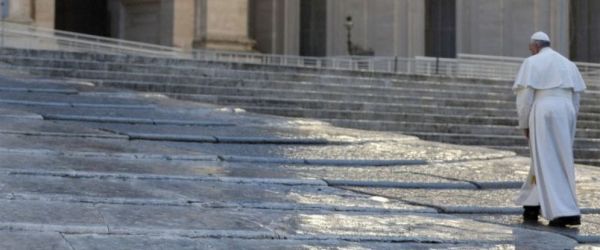The Gospel passage for this Sunday (cf. Mk 1:21-28) presents Jesus who, with his small community of disciples, enters Capernaum, the city where Peter lived and which at that time was the largest in Galilee. And Jesus enters that city.
The evangelist Mark relates that Jesus, being that day a Sabbath, immediately went into the synagogue and began to teach (cf. v. 21). This suggests the primacy of the Word of God, Word to be heard, Word to be received, Word to be proclaimed. Arriving in Capernaum, Jesus does not postpone the proclamation of the Gospel, he does not think first of the logistical arrangement, certainly necessary, of his small community, he does not delay in organising it. His main concern is to communicate the Word of God by the power of the Holy Spirit. And the people in the synagogue are impressed, because Jesus "taught them as one having authority, and not as the scribes" (v. 22).
What does 'with authority' mean? It means that in the human words of Jesus one felt the full force of the Word of God, one felt the very authority of God, the inspirer of the Holy Scriptures. And one of the characteristics of the Word of God is that it realises what it says. For the Word of God corresponds to his will. Instead, we often utter empty, rootless words or superfluous words, words that do not correspond to the truth. Instead, the Word of God corresponds to the truth, it is unity with his will and realises what he says. In fact, Jesus, after preaching, immediately demonstrates his authority by freeing a man, present in the synagogue, who was possessed by the devil (cf. Mk 1:23-26). It was precisely Christ's divine authority that had aroused the reaction of Satan, who was hiding in that man; Jesus, in turn, immediately recognised the voice of the evil one and "sternly commanded: 'Be silent! Come out of him!'" (v. 25). By the power of his word alone, Jesus delivers the person from the evil one. And again those present are amazed: "He commands even the unclean spirits and they obey him!" (v. 27). The Word of God creates astonishment in us. It possesses the power to make us amazed.
The Gospel is a word of life: it does not oppress people, on the contrary, it frees those who are enslaved to so many evil spirits of this world: the spirit of vanity, attachment to money, pride, sensuality... The Gospel changes hearts, it changes lives, it transforms evil inclinations into good intentions. The Gospel is capable of changing people! It is therefore the task of Christians to spread its redeeming power everywhere, becoming missionaries and heralds of the Word of God. This is also suggested to us by today's passage, which closes with a missionary opening and says: "His fame - the fame of Jesus - immediately spread everywhere, throughout the whole region of Galilee" (v. 28). The new doctrine taught with authority by Jesus is that which the Church brings to the world, together with the effective signs of his presence: the authoritative teaching and the liberating action of the Son of God become the words of salvation and the gestures of love of the missionary Church. Always remember that the Gospel has the power to change lives! Do not forget this. It is the Good News, which transforms us only when we allow ourselves to be transformed by it. That is why I always ask you to have daily contact with the Gospel, to read it every day, a passage, a passage, to meditate on it and also to carry it with you everywhere: in your pocket, in your bag... In other words, to nourish yourself every day from this inexhaustible source of salvation. Do not forget! Read a passage from the Gospel every day. It is the power that changes us, that transforms us: it changes lives, it changes hearts.
Let us invoke the maternal intercession of the Virgin Mary, She who received the Word and generated it for the world, for all men. May she teach us to be assiduous listeners and authoritative proclaimers of the Gospel of Jesus.
[Pope Francis, Angelus 1 February 2015]












